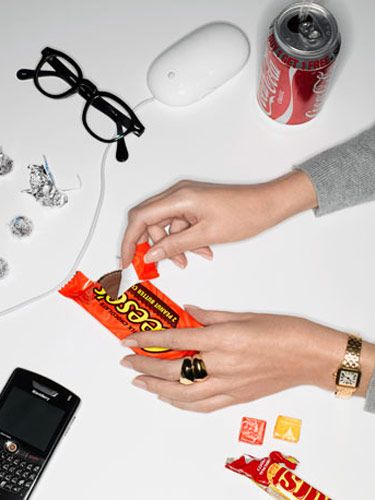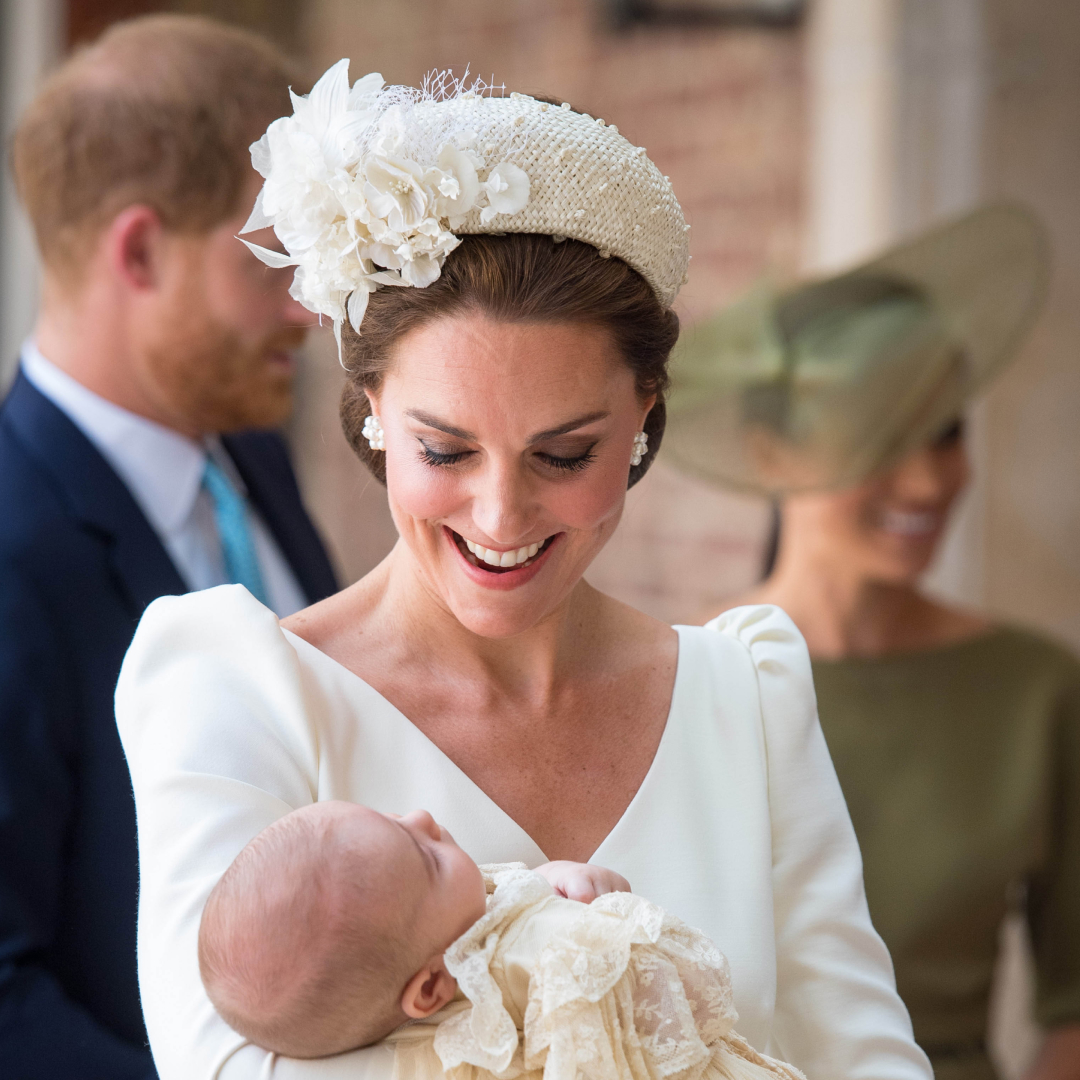Smart Girls, Bad Habits
Stop drunk-texting your ex, snacking late-night, and skipping the gym! New research into how the brain really works may help you get into a positive groove — once and for all.

Lisa Allen, 34, had struggled with her weight most of her life. She had been smoking and drinking since she was 16, and had problems managing her money and debt. When her husband left her for another woman, she was poised for a downward spiral. However, something clicked in Allen. She started to plan a trip, something to look forward to — trekking through the desert in Egypt. It was a crazy idea, she admitted, but in order to get into shape for her dream vacation, she replaced her old habit of smoking with jogging, which in turn changed her daily routine — how she ate, looked, and spent her time and money. Over the course of four years, she lost 60 pounds, completed a marathon, bought a home, and got engaged. By replacing one single pattern, she changed the rest of her life.
Allen is the first success story in New York Times reporter Charles Duhigg's new book, The Power of Habit: Why We Do What We Do in Life and Business. The latest in a crop of books on changing how we behave — Willpower by Roy F. Baumeister and John Tierney and The Willpower Instinct by Kelly McGonigal, Ph.D., also recently hit bookstores — it taps into cutting-edge research in neuroscience, psychology, and even consumer research (how brands get us to buy things) to explain why it's so hard to stick to our intentions (go to the gym! Stop seeing your ex! Avoid that third margarita!). And even more important, it gives us a blueprint of how to reprogram ourselves with a minimum amount of effort.
Good old-fashioned willpower won't get you very far in Duhigg's book. According to the latest studies, the brain clings to old routines — they're easy and conserve our decision-making neurons so we can save them for problem-solving at work or figuring out what to wear in the morning. Habits become encoded — everything from brushing your teeth in the morning to buying a new pair of shoes you don't need to falling for the wrong guy over and over. We do them without thinking. "Without our habits, our brains would be overwhelmed with details," explains Duhigg. At best, habits are our brains' way of simplifying our lives and saving us stress and energy. At worst, they're our brains being lazy. But because habits are hardwired, the strategy is not to undo them. According to Duhigg, the trick is to replace a bad behavior with a better one.

Here's how it works: All habits, good or bad, can be broken down into three components, called a "habit loop." It begins with a craving, a cue — a certain time of day, for example — that triggers your brain to go on autopilot and indulge in a habit, like lighting up a cigarette or snacking. That routine is followed by a reward, like a feeling of relief or distraction from boredom. This is the emotional payoff the brain needs to decide whether a routine is worth becoming a habit. "Rewards are key because they satisfy cravings," notes Duhigg. "Focusing on rewards trains that part of the brain responsible for linking positive emotions to new habits, which makes them easier to maintain."
Say you and your coworkers have an after-work ritual of hitting happy hour together every evening. But you'd like to save a few calories and a few bucks. What is the reward you really crave from cocktail time? Is it the socializing? If so, try switching the activity to a Spin class with great music you and they can do together. Is it the relaxation? Maybe a hot, luxurious bath could be an option.
Sounds easy, but why hasn't anyone thought of this before? "People spend a lot of time trying to break habits using willpower, but research is showing that habits are the opposite of willpower," explains Duhigg. "With willpower, you have to make a decision, which can be derailed by life's stresses. Habits require no willpower, no decision — they stick because they are effortless and automatic. The key to changing behavior is to reinforce the habits you want with the right reward."
For months, Emily Esson, 24, a jewelry designer in Loomis, California, had tried to practice yoga more consistently. "It always seemed like such a hassle — finding my mat, changing my clothes, getting to class. Yoga was just another thing on my to-do list," she recalls. No wonder she could count on one hand how often she went. That is, until she started to focus less on the challenges of getting to class and more on how good she felt afterward (the reward). It was a small tweak, but it worked. Esson started going to yoga more often. Pretty soon, she developed a new routine: She wears a sports bra under her daytime clothes and stashes a mat and a clean change of clothes in the trunk of her car. Now whenever she wavers, she thinks about how relaxed yoga makes her feel. "That's enough to get me there — I crave that feeling," she says.
Stay In The Know
Get exclusive access to fashion and beauty trends, hot-off-the-press celebrity news, and more.

Small Changes, BIG IMPACT
Here's your new plan for swapping out your old habits for new ones:
START SPECIFIC
The more concrete you can be about your goals, the better, notes Julie Naylon, owner of No Wire Hangers, a Los Angeles — based professional organizing service — "not just a general Get organized," she says, "but a Clear off my desk by filing my piles of papers."
START SMALL, GO SLOW
It's easy to get overwhelmed and give up when dealing with life-altering changes. So break big goals into baby steps. If you're trying to stick to a budget, resolve to pack a lunch three days a week instead of going out. You'll feel accomplished making even small changes — and small changes are easier to stick to.
PRACTICE DAILY
Whether you're trying to get up earlier or watch less TV, you'll need to be consistent with your efforts in order to see results. "Practicing once in a while or when you think of it is not enough," Charles Duhigg says. "Remember, you want the new behavior to become automatic. That takes repetition."
BE ACCOUNTABLE
Write down your goal and post it where you'll see it daily. Or tell a friend about it. Getting to yoga on the weekends was hit-or-miss for Emily Esson until she made plans to meet a friend there. "Knowing she was waiting for me got me to class and made me keep up the commitment," Esson says.
EXPECT SLIPUPS
No one's perfect, so avoid all-or-nothing thinking if you mess up. Marcia Friel, a Chicago-based professional organizer, suggests "quickies" to show yourself that you're still capable of meeting your goal. "Say you've let desk organization slide for a week. Get back in the saddle with the One-Minute Rule," she explains. "Give yourself a minute to clear as many things from your inbox." That minor feeling of accomplishment may be enough to get you back on your new-habit track.
REWARD YOURSELF
Feeling good is the ultimate incentive for keeping a habit. So remember to savor how satisfied you feel when you practice your good habits.
-
 In 'Sinners,' Music From the Past Liberates Us From the Present
In 'Sinners,' Music From the Past Liberates Us From the PresentIn its musical moments, Ryan Coogler's vampire blockbuster makes a powerful statement about Black culture, ancestry, and art.
By Quinci LeGardye
-
 Kendall Jenner Has the Last Word on the Best Travel Shoes
Kendall Jenner Has the Last Word on the Best Travel ShoesLeave your ballet flats in your checked bag.
By Halie LeSavage
-
 Prince Harry Gave Nephew Prince Louis an Extremely Rare Five-Figure Gift for His Christening
Prince Harry Gave Nephew Prince Louis an Extremely Rare Five-Figure Gift for His ChristeningUncle Harry for the gifting win.
By Kristin Contino
-
 The 13 Best Virtual Date Night Ideas
The 13 Best Virtual Date Night IdeasWhether you're on your first date with them or your hundredth.
By Bianca Rodriguez
-
 57 Thoughtful Gifts for Your Boyfriend
57 Thoughtful Gifts for Your BoyfriendThat was easy.
By Julia Marzovilla
-
 Michelle Young's 'Bachelorette' Season: Everything We Know
Michelle Young's 'Bachelorette' Season: Everything We KnowOne of the contestants is set to be the next Bachelor.
By Marie Claire
-
 The 17 Best Dating Sites and Apps
The 17 Best Dating Sites and AppsFeatures It's time to meet your match.
By Julia Marzovilla
-
 The 20 Best LGBTQ+ Movies Ever
The 20 Best LGBTQ+ Movies EverFeatures Celebrate Pride Month by watching these excellent movies.
By Katherine J. Igoe
-
 'The Heart Principle' Is Our September Book Club Pick
'The Heart Principle' Is Our September Book Club PickRead an excerpt from Helen Hoang's latest romance novel, here, then dive in with us throughout the month.
By Rachel Epstein
-
 Who Is Blake Moynes From 'The Bachelorette'?
Who Is Blake Moynes From 'The Bachelorette'?Features Bachelor fans are about to see a lot more of him.
By Megan DiTrolio
-
 'Skye Falling' Deserves a Spot on Your Summer Reading List
'Skye Falling' Deserves a Spot on Your Summer Reading ListIn July, Marie Claire read Mia McKenzie's 'Skye Falling.' See what the #ReadWithMC community thought about the book here.
By Marie Claire